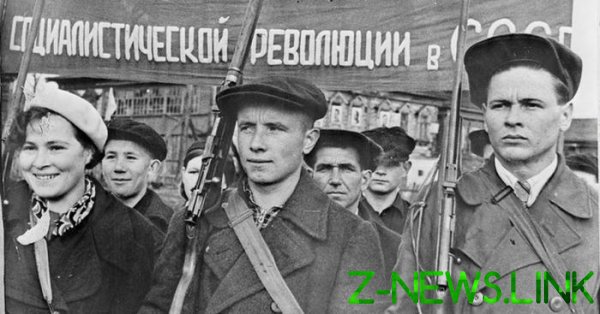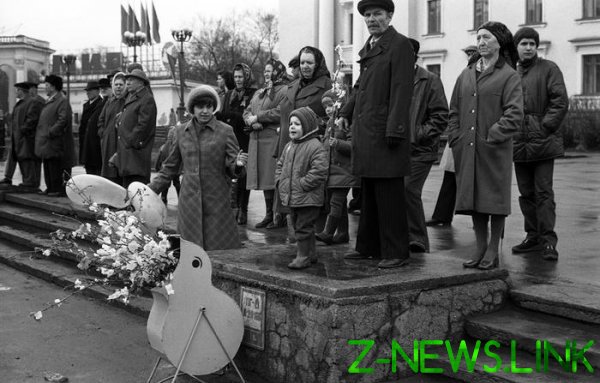

So, friends — today will be a post on my plans for a long time and a very interesting topic — exposing the myth of some kind of “special kindness” of the Soviet people. Adherents of this myth like to tell stories from the series “before the grass was greener and water is wet” — the alleged Soviet Union were all very kind and helpful, constantly smiling and was always willing to help each other. Like, before there were people as people, and now even the cigarette does not shoot anyone.
Of course — all this is nothing more than a myth, and the myth is dangerous enough — the younger generation listens to these stories and thinks that the Soviet Union was the country any good and incredibly good people, and now all at once it became bad, and everything became evil. And that is why this myth should be exposed — that I will do tonight.
So in today’s post — debunking the myth about “special goodness” of the Soviet man. Make sure you check out the article below, write in the comments your opinion, well to friends to add do not forget)
Where did the Soviet people?
In order to understand the inadequacy of stories about some very special Soviet “kindness”, let us first again recall, where did the Soviet people and what character traits have become characteristic of him. After revolution of 1917 year, came to power the Bolsheviks, who imagine they are empowered to create the future that society can be changed manually. This is generally a very dangerous idea from a mathematical point of view in the prediction of these processes is taken into account very few variables, and the result is not always what was intended — as happened in the case of the Soviet Union.
However, the Bolsheviks were covered by these dangerous ideas, and began to rebuild society in their own way. Good grandpa Lenin, friend of the children said that all the carriers of the old culture must be destroyed, why the Bolsheviks in the 1920-ies launched a policy of “Great terror”. The great improver and linguist continued the policy good and ever-living grandfather — creating the GULAG, and upon completion of the formation of the system of distribution of benefits and handouts — now lived well only by thosewho fed from the hands of the Soviet regime, and strongly maintained.
And then something happened that was supposed to happen — is the appearance of “moral Soviet man”, which glorified the Soviet propaganda — began to form a very different type of a typical scoop. A typical scoop was a carrier of double morality (“some words for kitchens, the other for the streets”), was an opportunist, he felt justified to deceive others (since it is cheating the state), fawn before those in power and tried to get at least a little power over someone.
Happened this way not because living on the territory of the USSR peoples were “not such” — people simply were forced to adapt to survival in the new system, and society began to change. No special “kindness” was not in it, as we will discuss in detail in other sections of the post.
Repression and denunciations.

Let’s start with the early years of the Soviet Union — in 1930-50-ies in the scoop flourished whistleblowing. The Stalinist decades brought a very special type of Soviet man-informer — would he nice of you to smile, be quiet and polite neighbor in the communal apartment or a discreet colleague in the office — but he is very closely followed your words and actions, and just that — tried to convey to the authorities.
Were taken from informers? By itself, the denunciation was a certain measure of displacement of total fear, which was saturated with Stalin’s Soviet Union — “if I have to carry, the power to receive me for her, and at least I’ll stay alive.” Soviet informers, struck by Stockholm syndrome, even started to feel any special importance and necessity of their denunciations, as if began to play with authority in the same field, prikazivati to the team predators — “look, I’m the same as you!”.
The other party of the Soviet denunciation was a tangible reward — one time scammers could claim the property of someone who has taken on a tip — at the very least, could wish for the liberation of his room in a communal apartment and qualify for this housing. We can only guess what terrible and disgusting things people wrote to each other in those years, partially declassified archives to come across denunciations such as “Metalworker Nicholas C. keeps in the kitchen butter instead of margarine and clearly living on unearned income,” or “My roommate Natalie N. stated that we’re starving, and Stalin now probably white buns eats — what played into the hands of the capitalist intelligence services.”
In General, there is no “kindness” of the Soviet people in those years were not observed. It was grey and poor society riddled with informers and mutual distrust. Yes, you can remember some good stories, but overall society was exactly that — survived those who denounced, not those who denounced. Also recall that the entire staff of the Gulag, all segregated and the NKVD also did not come from Mars, and were recruited from those “good Soviet people.”
Envy, flats and a fur hat.

Now, let’s see what we have with the Soviet kindness occurred in more recent times. Maybe with the death of Stalin things became dramatically better? Special “kindness”, too, as it was not observed — with the growing prosperity grew and envy each other. This is another way the myth that the Soviet people allegedly nobody envied — envied, even as. Vasya apartment, and we have one bedroom that is envy. Valera bought a vacuum cleaner and I bought — envy. Val “get” a trip to Bulgaria, where I brought some beautiful boots, and I didn’t get it, and not brought — envy, envy, envy.
To get those or other goods “good” the Soviet people did not disdain to go over the heads, Yes, each other has not written denunciations in the NKVD — was a different time, but the “drop” on a person in any local party office was considered quite normal. To “bypass” this or that person in the race for the good things of life even considered something worthy and successful — say, I figured out how to survive in the system, and Ivanov did not understand, not “hurry up”, not “got” — well, it serves him right.
It is the jealousy was often the main engine of the internal development — like, I too want to live like Petrov, who works in the trade and goes on the “Volga”, I want to make a party career, as Sidorov, and live in five-room apartment in the departmental building. While everyone was thinking mostly about yourself — made a career, okay, “do not talk too much, and I will go to jail”. No kindness in this society, and did not smell.
The country has banned smiles. Instead of an epilogue.

In the last section of the post wants to say more about the pure communication aspects of Soviet life — because of total poverty, insecurity and limited resources the majority of the Soviet people was not something that good — they often were simply angry. Fights and swearing in the stores, shoving and rudeness in crowded public transport, queues at clinics — all were not conducive to some kind of “kindness” and contributed to the fact that people were angry and aggressive. Even the photo of the Soviet people are smiling very rarely pay next time attention to it when you review the collection of Soviet photo.
In General, all stories about some kind of “special kindness” of the Soviet people — no more than a myth. I think nowadays people are much more kind, sympathetic and less aggressive.
© 2019, paradox. All rights reserved.





